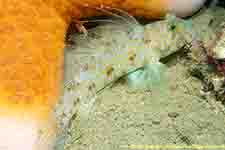 Filamented (Akihito's) goby, Eayrius akihito
Filamented (Akihito's) goby, Eayrius akihitoWe took an underwater photography trip to the Philippines in December 2016. We returned in November 2024.
Gobies are small-to-medium-sized ray-finned fish with large heads and tapaered bodes.
 Filamented (Akihito's) goby, Eayrius akihito
Filamented (Akihito's) goby, Eayrius akihito
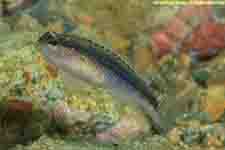 Striped goby, Asterropteryx striata
Striped goby, Asterropteryx striata
Shrimp gobies live in symbiotic relationships with certain alpheid shrimps. The shrimp excavates and maintains a burrow used by both animals while the goby, which has much better vision, acts as a lookout for predators. The shrimp maintains almost constant contact with the fish with an antenna.
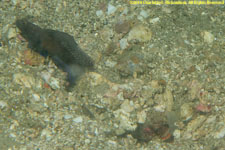 Magnificent shrimpgoby, Flabelligobius (Tomiyamichthys) sp.
Magnificent shrimpgoby, Flabelligobius (Tomiyamichthys) sp.
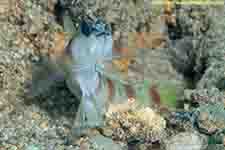 Steinitz' shrimpgoby, Amblyeleotris steinmitzi
Steinitz' shrimpgoby, Amblyeleotris steinmitzi
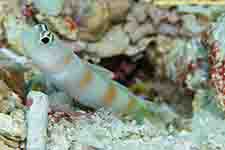 Flagtail shrimpgoby, Amblyeleotris yanci
Flagtail shrimpgoby, Amblyeleotris yanci
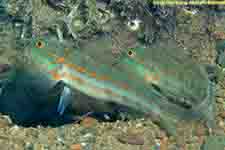 Orange-dashed (Orange spotted sleeper) goby, Valenciennea puellans
Orange-dashed (Orange spotted sleeper) goby, Valenciennea puellans
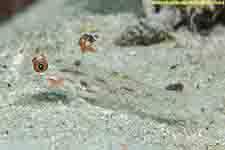 Signalfin goby, Coryphopterus signipinnis
Signalfin goby, Coryphopterus signipinnis
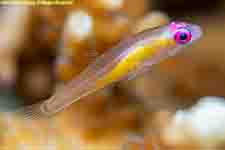
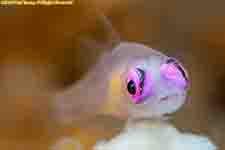 Redeye hovering goby, Bryoninops natans
Redeye hovering goby, Bryoninops natans
Ghost gobies are native to the Indian Ocean and western Pacific Ocean.
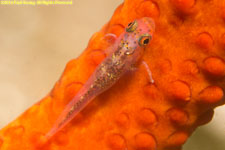
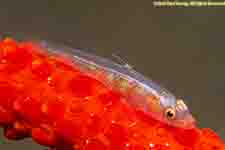
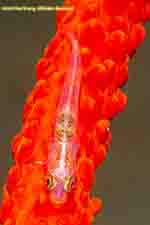 Common ghostgoby, Pleurosicya mossambica
Common ghostgoby, Pleurosicya mossambica
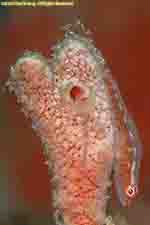
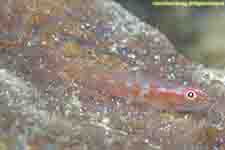 Stony coral ghostgoby, Pleurosicya micheli
Stony coral ghostgoby, Pleurosicya micheli
Pygmy gobies are short-lived gobies characterized by their small size. They are also called dwarf gobies.
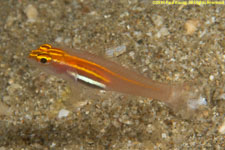 Neon pygmygoby, Eviota pellucida
Neon pygmygoby, Eviota pellucida
Coral gobies, also called clown gobies, are not burrowers like most other gobies, but prefer to inhabit branches of hard corals.
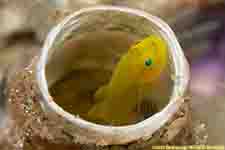
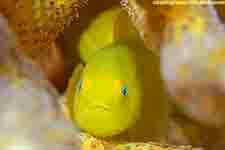 Yellow clown (coral) goby, Gobiodon okinawae
Yellow clown (coral) goby, Gobiodon okinawae
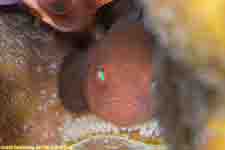 Lemon coralgoby, Gobiodon citrinus
Lemon coralgoby, Gobiodon citrinus
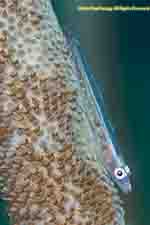
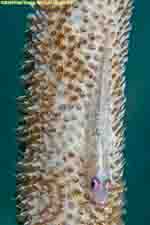 Translucent coralgoby, Bryaninops erythrops
Translucent coralgoby, Bryaninops erythrops
©2016, 2017, 2024 Mermaid Underwater Photographic. All Rights Reserved.
Contact us at mermaid@underwater.org.
Last modified 11 December 2024